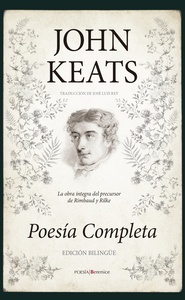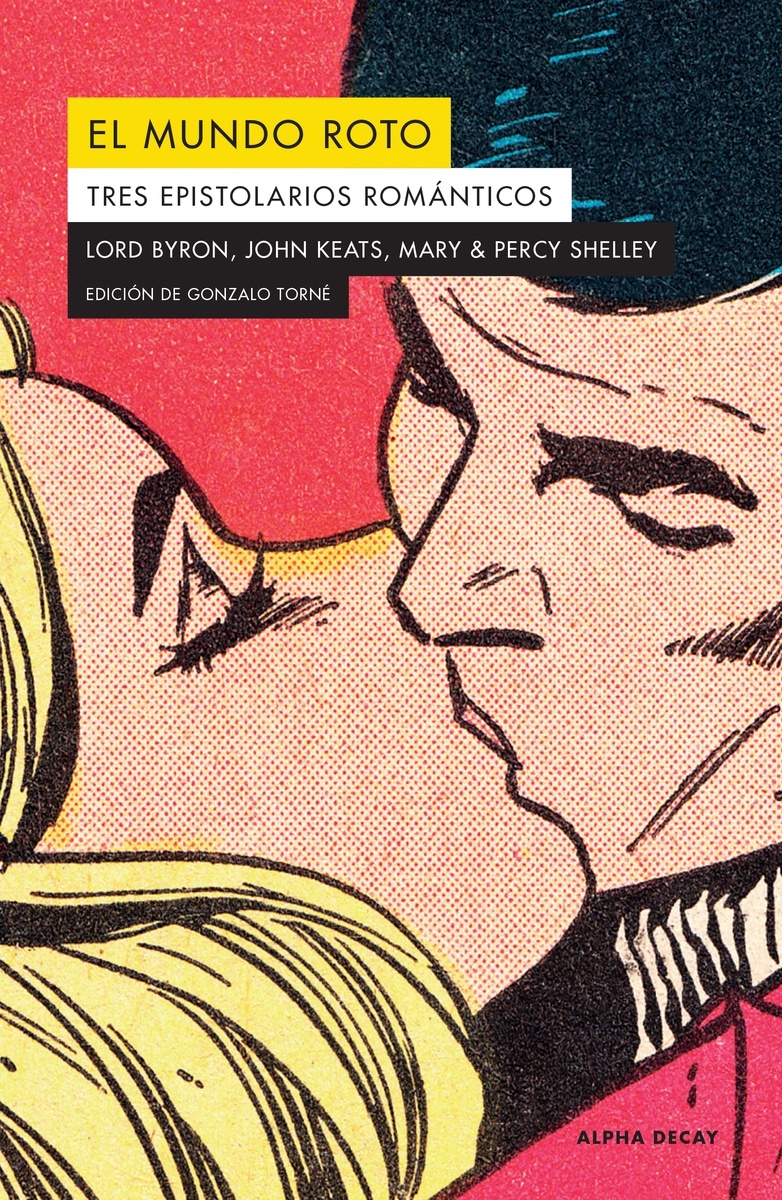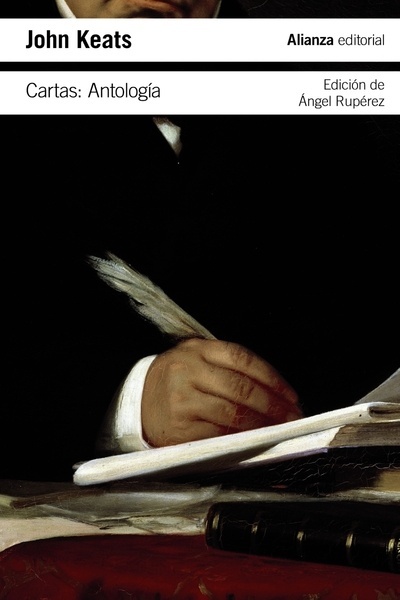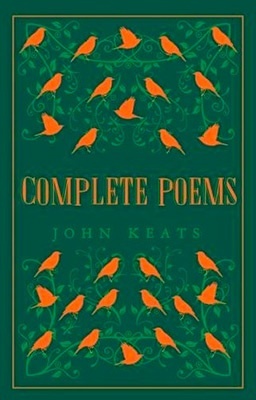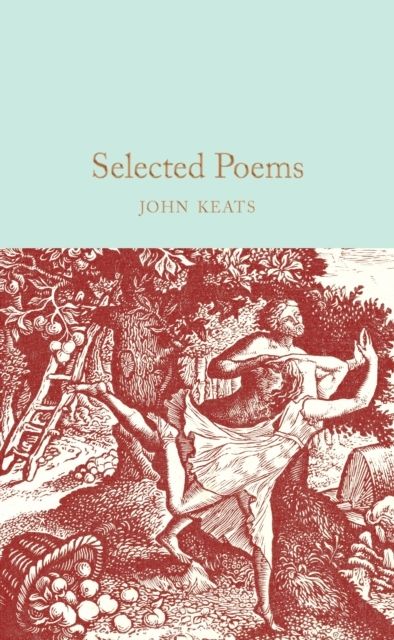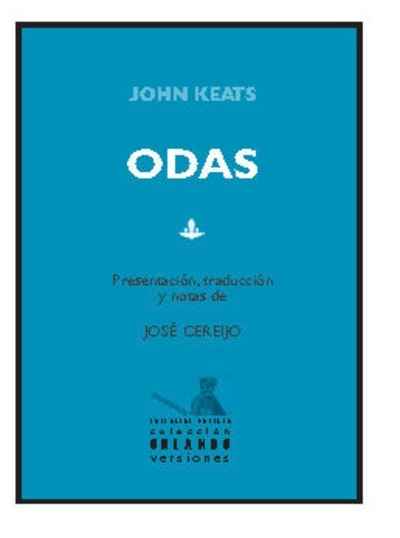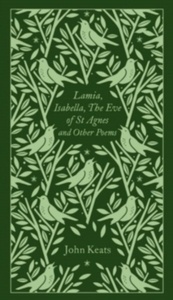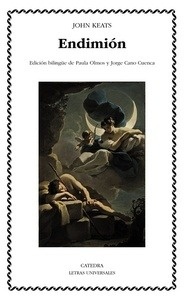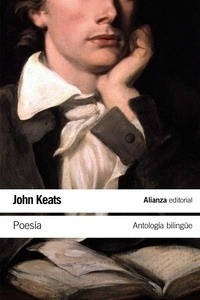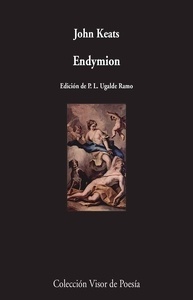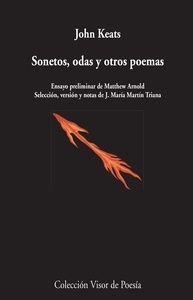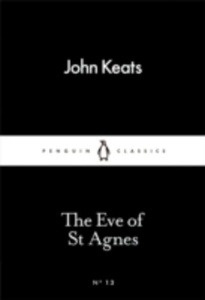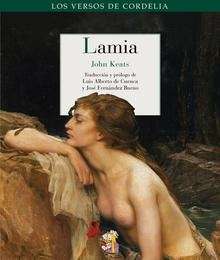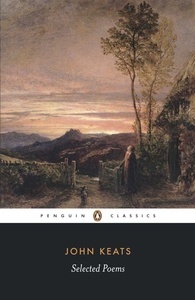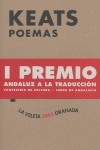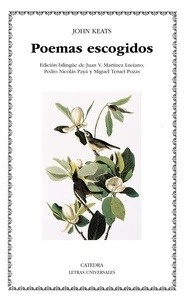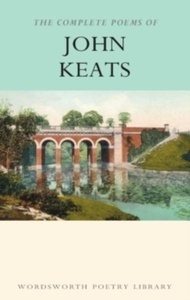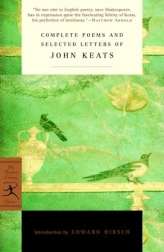John Keats
John Keats was born in London in living quarters connected with his maternal grandfather's livery stable, the Swan and Hoop Inn, on October 31, 1795. He was the eldest of five children (one of whom died in infancy) begot by Thomas and Frances Jennings Keats. His father was the chief hostler at the Swan and Hoop, and the family prospered. The boy was eight years old when Thomas Keats was killed in a riding accident; the next year, in 1805, Keats's grandfather died. When the future poet was fourteen, his mother (after an unsuccessful remarriage) succumbed to tuberculosis. By then, however, Keats had received a liberal education at the progressive Clarke school, a private academy in the village of Enfield, twelve miles north of London, where for eight years he studied English literature, modern languages, and Latin. (He began translating Virgil's Aeneid while still at shcool.) Charles Cowden Clarke, the headmaster's son, remembered him as an outgoing youth who made friends easily and fought passionately in their defense. A fellow student recalled his pugnacious spirit: 'Keats was not in childhood attached to books. His penchant was for fighting. He would fight any one.' Yet George Keats spoke of his brother's 'nervous, morbid temperament' (perhaps attributable to a complex about being short 'poor little Johnny Keats' was barely five feet tall) and of his having 'many a bitter fit of hypochondriasm.' Indeed Keats himself wrote: 'My mind has been the most discontented and restless one that ever was put into a body too small for it.'
In 1811 Keats left the Clarke school to become a surgeon's apprentice first at Thomas Hammond's apothecary shop in a small town near Enfield and later in London at Guy's Hospital. (Surgery would have been a respectable and reasonable calling for someone of Keats's means: unlike the profession of medicine, it did not require a university degree. Moreover, Keats always maintained he was 'ambitious of doing the world some good.') During his five years of study for a license, the young apprentice completed his translation of the Aeneid and 'devoured rather than read' Ovid's Metamorphoses, Milton's Paradise Lost, and other books he borrowed from the Clarke school. But the work that decisively awakened his love of poetry indeed shocked him suddenly into self-awareness of his own powers of imagination was Edmund Spenser's Faerie Queene. At some point in 1814 Keats composed his first poem, 'In Imitation of Spenser.' Although he struck medical colleagues as an 'idle loafing fellow, always writing poetry,' Keats passed the apothecaries' examination that allowed him to practice surgery on July 25, 1816.
In the meantime, his poetic genius was being recognized and encouraged by early friends like Charles Cowden Clarke and J. H. Reynolds, and in October 1816 Clarke introduced him to Leigh Hunt, whose Examiner, the leading liberal magazine of the day, had recently published Keats's sonnet 'O Solitude.' Five months later, on March 3, 1817, Poems, his first volume of verse, appeared. Despite the high hopes of the Hunt circle, it was a failure. During the fall of that year, Keats stayed with Oxford student Benjamin Bailey at Magdalen College. While Bailey crammed for exams, Keats worked on Endymion, his four-thousand-line romantic allegory; the two read and discussed Wordsworth, Hazlitt, Milton, Dante, and Shakespeare. Back in London, on November 22, 1817, Keats wrote to Bailey the first of his famous letters to friends (and siblings) on aesthetics, the social role of poetry, and his own sense of poetic mission. Rarely has a poet left such a remarkable record of his thoughts on his own career and its relation to the history of poetry. (The letters also reveal the astonishing speed with which Keats matured as an artist.) Yet by the time Endymion was published in April 1818, Keats's name had been identified with Hunt's 'Cockney School,' and the Tory Blackwood's Magazine delivered a violent attack on Keats as an 'ignorant and unsettled pretender' to culture who had no right to aspire to poetry.
Although the critical reaction to Endymion was infamous for its ferocity, the youthful bard was hardly destroyed by it despite Byron's famous quip that Keats was 'snuffed out by an Article.' The surprising truth is that he entered upon an interval of astonishing productivity, perhaps the most concentrated period of creativity any English poet has ever known. In the summer of 1818, Keats journeyed to Scotland with Charles Brown, the rugged, worldly businessman who was one of his most loyal friends. There he vowed: 'I shall learn poetry here and shall henceforth write more than ever.' That fall he began composing Hyperion, his imitation of and challenge to Milton's Paradise Lost; even critics saw the work as a major achievement. In December, following his brother Tom's death from tuberculosis, Keats went to live with Charles Brown in Wentworth Place, Hampstead. There, almost in spite of himself, the young poet fell helplessly in love with Fanny Brawne, the eighteen-year-old daughter of a widowed neighbor; a year later they were betrothed. In 1819 Keats produced 'The Eve of St. Agnes,' 'La Belle Dame Sans Merci,' the major odes, Lamia, the Dantean dream-vision The Fall of Hyperion, and the five-act verse tragedy Otho the Great (written in collaboration with Brown).
On February 3, 1820, Keats suffered a pulmonary hemorrhage that signaled an advanced stage of tuberculosis. He quickly broke off his engagement and began what he called a -posthumous existence.' His career as a poet was effectively ended, although the volume Lamia, Isabella, The Eve of St. Agnes, and Other Poems, containing the bulk of Keats's claim to immortality, was published that July. In a desperate attempt to recover his health in a milder climate, Keats sailed for Italy in September accompanied by the painter Joseph Severn. Declining an invitation to stay with Shelley in Pisa, the two arrived in Rome on November 15 and took up residence in rooms overlooking the Piazza di Spagna. John Keats died in Rome on the night of February 23, 1821, and was buried there on February 26 in the Protestant Cemetery. On his deathbed Keats requested that his tombstone bear no name, only the words 'Here lies one whose name was writ in water.'
Mostrando 19 libros encontrados (1 páginas)
1
-
- Berenice, 2022
Libro encuadernado en tapa blanda · 1104 páginas
PVP: 45,00 €
ISBN 978-84-17954-47-5
EAN 9788417954475
John Keats es uno de los primeros y más asiduos cultivadores de la metapoesía en su siglo.En este sentido, y en otros, anuncia ya a Rimbaud y a Rilke.Como el francés, es un poeta visionario.Como el poeta de lengua alemana, convierte en objeto de arte, en poema-cosa, lo que toca.Midas alegre de la imaginación poderosa, ...
más informaciónSin ejemplares (se puede encargar)
-
Byron, George Gordon (Lord Byron); Keats, John; Shelley, Mary; Shelley, Percy Bysshe
El mundo roto
Tres epistolarios románticos- Alpha Decay, 2020
Libro encuadernado en tapa blanda · 336 páginas
PVP: 23,90 €
ISBN 978-84-121442-0-8
EAN 9788412144208
Lord Byron, Percy Shelley y John Keats forman una trinidad inseparable en la literatura inglesa de principios del siglo XIX: son los principales exponentes de la segunda generación de poetas románticos, tuvieron una vida corta, aventurera e intensa, y su obra ha trascendido el paso del tiempo, unida y dirigida por el hilo invisible del ...
más informaciónSin ejemplares (se puede encargar)
-
Las cartas de John Keats (1795-1821) son en buena medida el relato impremeditado, casual y espontáneo del descubrimiento de la poesía por parte de un joven que iba para médico y que renunció a serlo por una causa mayor que se le impuso como una revelación: la Poesía misma.Pero también estas cartas hablan de sus ...
más informaciónDisponibilidad inmediata (en stock)
-
- Alma Books Ltd, 2019
Libro encuadernado en tapa blanda · 520 páginas
PVP: 15,50 €
ISBN 978-1-84749-756-7
EAN 9781847497567
Already with thee! tender is the night, And haply the Queen-Moon is on her throne, Cluster'd around by all her starry Fays; But here there is no light, Save what from heaven is with the breezes blown Through verdurous glooms and winding mossy ways. Despite his tragically short life, John Keats, a self-confessed "rebel Angel", ...
más informaciónDisponibilidad inmediata (en stock)
-
- Pan, 2019
Libro encuadernado en tapa dura con sobrecubierta · 272 páginas
PVP: 15,50 €
ISBN 978-1-5098-8717-0
EAN 9781509887170
John Keats is regarded as one of the greatest poets of the Romantic movement. But when he died at the age of only twenty-five, his writing had been attacked by critics and his talent remained largely unrecognized. Part of the Macmillan Collector's Library; a series of stunning, clothbound, pocket sized classics with gold foiled edges ...
más informaciónDisponibilidad inmediata (en stock)
-
Odas
Edición bilingüe comparada- Polibea, 2018
Libro encuadernado en tapa blanda · 70 páginas
PVP: 10,00 €
ISBN 978-84-86701-99-4
EAN 9788486701994
Las Odas representan un lugar donde vivir, y donde conseguir, viviendo, algo de aquella maduración espiritual a que él se refería en otra carta en la que ve al mundo como una escuela, y al corazón humano no sólo como la cartilla usada en ella para el aprendizaje, sino como la biblia del pensamiento, su ...
más informaciónSin ejemplares (se puede encargar)
-
- Penguin Books Ltd, 2017
Libro encuadernado en tapa dura · 144 páginas
PVP: 18,25 €
ISBN 978-0-241-30314-6
EAN 9780241303146
In the summer of 1820, Keats published this collection, his third and final volume of poetry. A few months earlier, he had started coughing up blood; the following February, he would die of tuberculosis in Rome, aged just twenty-five. This volume contains his greatest work, written in an astonishing burst of creative genius in 1819.It ...
más informaciónSin ejemplares (se puede encargar)
-
El malogrado poeta londinense John Keats, muerto en Roma de tuberculosis con tan solo veinticinco años, está considerado, junto con Shelley y Byron, como uno de los poetas más grandes de la llamada segunda ola del Romanticismo inglés. En su corta carrera publicó tres volúmenes de poesía, además de algunas piezas sueltas en revistas literarias. ...
más informaciónDisponibilidad inmediata (en stock)
-
Poesía
Antología bilingüe- Alianza, 2016
Libro encuadernado en tapa blanda · 184 páginas
PVP: 12,95 €
ISBN 978-84-9104-277-8
EAN 9788491042778
Junto con Wordsworth y Coleridge, junto con Shelley y Lord Byron, John Keats (1795-1821) forma parte de la brillante constelación de poetas románticos ingleses. Su obra, apreciada sin excesos durante su breve existencia, ha ido ganando con el paso del tiempo en la estima de los lectores, prendados a menudo por la fuerza de sus ...
más informaciónSin ejemplares (se puede encargar)
-
Durante mucho tiempo ha quedado estereotipada la imagen de Keats como poeta refinado y ultradelicado, que murió víctima de la incomprensión y crueldad del mundo literario de su época; es decir, ha pervivido la idea romántica de Keats como poeta maldito. La imagen de Keats entronca mejor con la de aquellos posteriores poetas puros para ...
más informaciónSin ejemplares (se puede encargar)
-
JOHN KEATS, nace en Londres en 1795 y muere en Roma, tuberculoso, en 1821, donde se encuentran sus restos bajo el siguiente epitafio: Aquí descansa aquel cuyo nombre quedó escrito en las aguas .Keats, que sin exagerada injusticia pudo escribir: No sé nada, no he leído nada , adivinó, a través de las páginas de ...
más informaciónSin ejemplares (se puede encargar)
-
- Penguin UK, 2015
Libro encuadernado en tapa blanda
PVP: 3,00 €
ISBN 978-0-14-139829-7
EAN 9780141398297
'Hoodwink'd in faery fancy...' This volume contains a selection of Keats' greatest verse - including his gothic story in verse, 'The Eve of St Agnes', and the mysterious 'Lamia' - exploring themes of love, enchantment, myth and magic. Introducing Little Black Classics: 80 books for Penguin's 80th birthday. Little Black Classics celebrate the huge range ...
más informaciónSin ejemplares (se puede encargar)
-
- Reino de Cordelia, 2013
Libro encuadernado en tapa blanda · 112 páginas
PVP: 12,95 €
ISBN 978-84-939974-7-2
EAN 9788493997472
Monstruo femenino de la mitología y el folklore de la Grecia y la Roma clásicas, Lamia es una especie de vampiro que chupa la sangre de los niños e incluso se los come. La leyenda habla de una Lamia, hija de Libia y Belo, que se convirtió en amante de Zeus, por lo que fue ...
más informaciónSin ejemplares (se puede encargar)
-
- Penguin UK, 2007
Libro encuadernado en tapa blanda · 320 páginas
PVP: 12,95 €
ISBN 978-0-14-042447-8
EAN 9780140424478
Over the course of his short life, John Keats (1795-1821) honed a raw talent into a brilliant poetic maturity. By the end of his brief career, he had written poems of such beauty, imagination and generosity of spirit, that he had - unwittingly - fulfilled his wish that he should 'be among the English poets ...
más informaciónSin ejemplares (se puede encargar)
-
- Comares, 2006
Libro encuadernado en tapa blanda · 184 páginas
PVP: 12,50 €
ISBN 978-84-9836-002-8
EAN 9788498360028
Sin ejemplares (se puede encargar)
-
- Cátedra, 2005
Libro encuadernado en tapa blanda · 224 páginas
PVP: 12,95 €
ISBN 978-84-376-1575-2
EAN 9788437615752
La selección bilingüe de poemas que aquí presentamos pretende ser suficientemente representativa del conjunto de la obra poética de Keats, y da nuestra del genio poético del autor. Se incluyen en ella una selección de poemas recogidos de varias de sus obras: Poems (1817) , Endymion , La víspera de Santa Inés , Lamia , ...
más informaciónDisponibilidad inmediata (en stock)
-
- Wordsworth Classics, 2003
Libro encuadernado en tapa blanda
PVP: 7,75 €
ISBN 978-1-85326-404-7
EAN 9781853264047
Sin ejemplares (se puede encargar)
-
- HIPERION EDICIONES, 2003
Libro encuadernado en tapa blanda · 200 páginas
PVP: 15,95 €
ISBN 978-84-7517-456-3
EAN 9788475174563
Sin ejemplares (se puede encargar)
-
- Modern Library, 2001
Libro encuadernado en tapa blanda · 640 páginas
PVP: 21,75 €
ISBN 978-0-375-75669-6
EAN 9780375756696
'I think I shall be among the English Poets after my death, ' John Keats soberly prophesied in 1818 as he started writing the blankverse epic "Hyperion." Today he endures as the archetypal Romantic genius who explored the limits of the imagination and celebrated the pleasures of the senses but suffered a tragic early death. ...
más informaciónSin ejemplares (se puede encargar)
1

